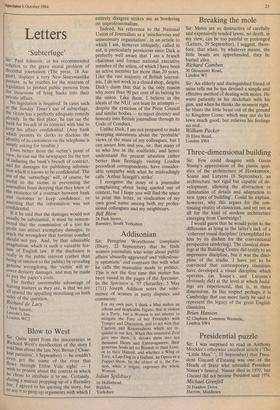Letters
'Subterfuge'
Sir: Paul Johnson, in his recommended solution to the grave moral problem of . deceitful journalism (The press, 18 Au- gust), displays a very New-Statesmanlike Posture, as he reaches for the nostrum of legislation to protect public persons from the incursions of lying hacks into their Private affairs.
No legislation is required. In cases such as the Sunday Times's use of subterfuge, the victim has a perfectly adequate remedy already. In the first place, he can sue the bank for breach of its contract with him to keep his affairs confidential. (Any bank which permits its clerks to disclose the identity of its customers on the telephone is simply asking for trouble.) Even better from the victim's point of view, he can sue the newspaper for the tort of inducing the bank's breach of contract, and for damages for publishing informa- tion which it knows to be confidential. The Use of the 'subterfuge' will, of course, be useful to the victim in preventing the journalists from denying that they knew of the existence of a contract between bank and customer to keep confidence, or asserting that the information was not Confidential.
If it be said that the damages would not usually be substantial, it must be remem- bered that the commission of a tort for Profit can attract exemplary damages, to teach the wrongdoer that tortious conduct should not pay. And, by that admirable pragmatism which is such a valuable fea- ture of English law, if the disclosure is really in the public interest (rather than being of interest to the public) by revealing genuine wrongdoing, the 'victim' will re- cover derisory damages, and may be made to pay the paper's costs. , The further inestimable advantage of leaving matters as they are, is that we are all spared the appalling moralising on both Sides of the question. Richard de Lacy 1 New Square,
Lincoln's Inn. London WC2














































 Previous page
Previous page